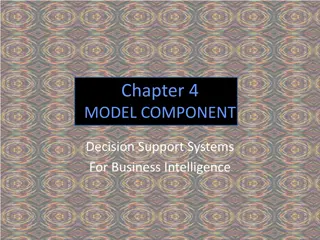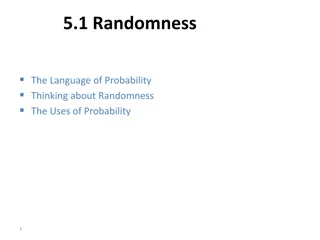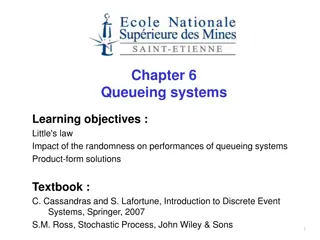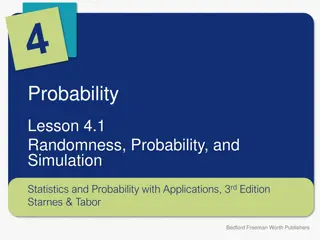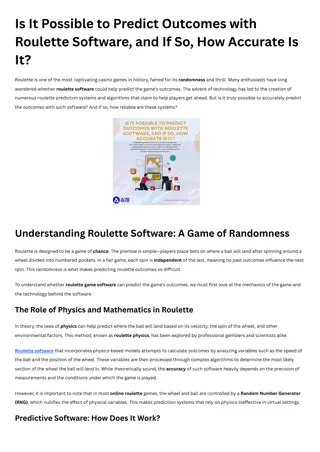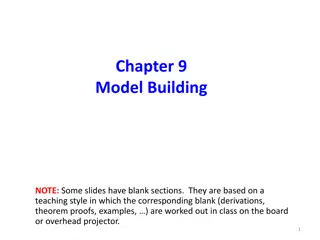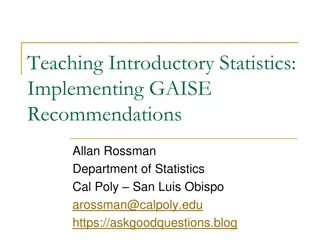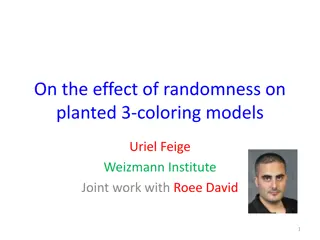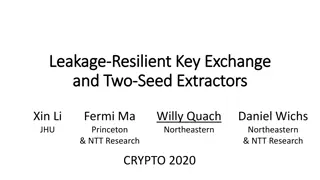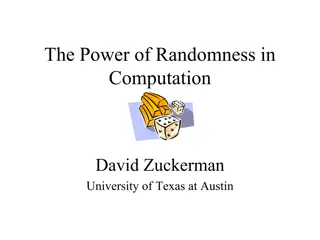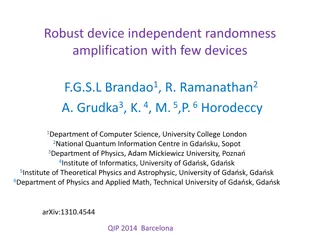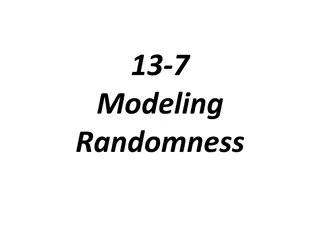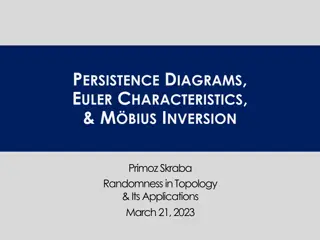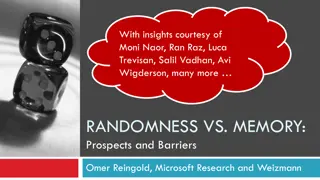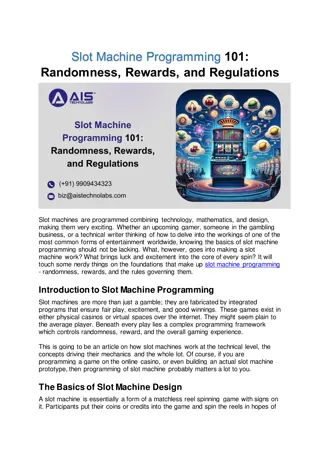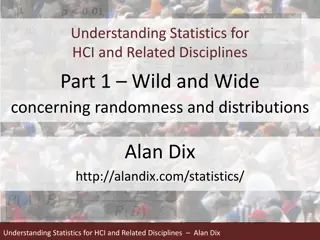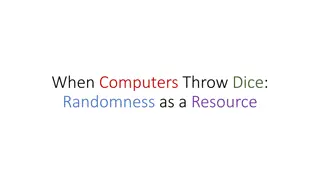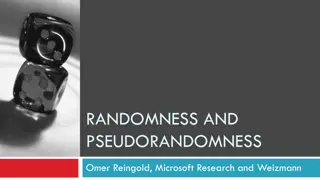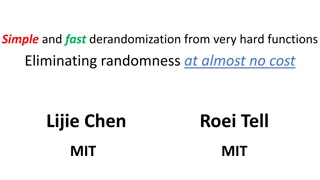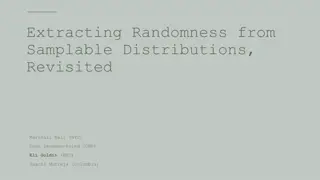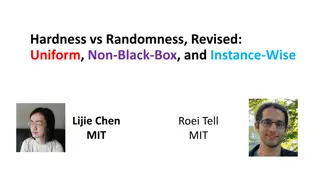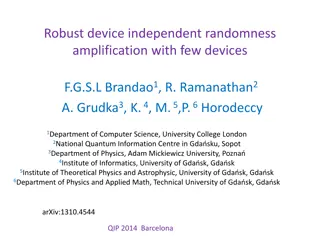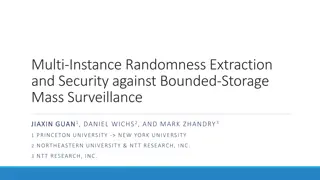Decision Support Systems for Business Intelligence Modeling
Explore the process of modeling in Decision Support Systems for Business Intelligence through images, tables, and examples. Learn about the dimensionality of models, nonlinear relationships, randomness, and Monte Carlo analysis as essential components in business decision-making.
2 views • 45 slides
Probability and Randomness
Probability and randomness play crucial roles in various aspects of life. Randomness refers to uncertain individual outcomes with a regular distribution over a large number of repetitions. Probability models help describe chance behavior by defining sample spaces, assigning probabilities to outcomes
10 views • 11 slides
Introduction to Queueing Systems and Applications
Explore the fundamentals of queueing systems, including Little's law, impacts of randomness, and product-form solutions. Delve into the history of queueing theory and its applications in traffic control, planning, and facility dimensioning. Understand the classification and characteristics of simple
6 views • 90 slides
High-Throughput True Random Number Generation Using QUAC-TRNG
DRAM-based QUAC-TRNG provides high-throughput and low-latency true random number generation by utilizing commodity DRAM devices. By employing Quadruple Row Activation (QUAC), this method outperforms existing TRNGs, achieving a 15.08x improvement in throughput and passing all 15 NIST randomness tests
4 views • 10 slides
Probability and Randomness
Explore the concepts of randomness, probability, and simulation in this informative lesson. Learn how to interpret probability as a long-run relative frequency, dispel common myths about randomness, and use simulation to model chance behavior. Delve into the idea that chance behavior is unpredictabl
4 views • 13 slides
Is It Possible to Predict Outcomes with Roulette Software?
This article provides a detailed exploration of whether roulette software can accurately predict outcomes in the game of roulette. It begins by explaining the randomness of roulette and the theoretical potential for physics-based prediction using var
3 views • 3 slides
Exploring the World of Quantum Money and Cryptography
Delve into the realm of quantum money, computation, and cryptography, understanding the intricacies of semi-quantum money, consensus problems, post-quantum cryptography, and unique concepts like certifiable randomness and tokenized digital signatures.
9 views • 30 slides
Testing Residuals for Model Appropriateness in ARMA Modeling
This content discusses the importance of checking residuals for white noise in ARMA models, including methods like sample autocorrelations, Ljung-Box test, and other tests for randomness. It also provides examples of examining residuals in ARMA modeling using simulated seasonal data and airline data
1 views • 40 slides
Enhancing Introductory Statistics Instruction with GAISE Recommendations
Explore how to implement the GAISE guidelines for teaching introductory statistics in college, emphasizing statistical thinking, conceptual understanding, real data integration, active learning, technology use, and assessments for student improvement. The goal is to develop students as critical cons
2 views • 26 slides
Impact of Randomness on Planted 3-Coloring Models
In this study by Uriel Feige and Roee David from the Weizmann Institute, the effect of randomness on planted 3-coloring models is investigated. The research delves into the NP-hard nature of 3-coloring problems, introducing a hosted coloring framework that involves choices like the host graph and th
1 views • 55 slides
Limited Randomness in Repeated Games
Dive into the world of randomness in repeated games through this insightful research by Moni Naor, Pavel Hubæk, and Jon Ullman. Discover the significance of randomness in algorithms, equilibria, and finitely repeated games. Explore the necessity of randomness in Nash Equilibrium and the computation
6 views • 28 slides
Leakage-Resilient Key Exchange and Seed Extractors in Cryptography
This content discusses the concepts of leakage-resilient key exchange and seed extractors in cryptography, focusing on scenarios involving Alice, Bob, and Eve. It covers non-interactive key exchanges, passive adversaries, perfect randomness challenges, and leakage-resilient settings in symmetric-key
6 views • 35 slides
The Power of Randomness in Computation
Explore the significance of randomness in various computational aspects including random sampling, cooking techniques, polling methods, investing strategies, and its role in computer science. It delves into randomized algorithms, Monte Carlo simulations, cryptography, and more.
5 views • 45 slides
Enhancing Cryptographic Key Generation with High-Quality Randomness
This presentation discusses the critical aspect of ensuring high-quality randomness in cryptographic key generation processes. It explores key vulnerabilities and common failure modes, emphasizing the importance of incorporating strong randomness. The content delves into various methods and issues r
2 views • 45 slides
Device Independent Randomness Amplification with Few Devices
This study focuses on robust device-independent randomness amplification with limited devices, emphasizing the importance of device independence in generating random outcomes free from external influences. Various sources of randomness, including Santha-Vazirani and Hmin types, and quantum mechanics
1 views • 21 slides
Randomness in Selection Processes
Explore two problems related to modeling randomness - one involving choosing random students to represent a homeroom and the other simulating a cereal company's prize distribution. Learn how random number tables can be used for fair selections and calculate the average number of cereal boxes a custo
4 views • 4 slides
Randomness in Topology: Persistence Diagrams, Euler Characteristics, and Möbius Inversion
Exploring the concept of randomness in topology, this work delves into the fascinating realms of persistence diagrams, Euler characteristics, and Möbius inversion. Jointly presented with Amit Patel, the study uncovers the vast generalization of Möbius inversion as a principle of inclusion-exclusio
2 views • 57 slides
Randomness in Computation: Insights and Prospects
Delve into the realm of randomness in computation as discussed by prominent researchers including Moni Naor, Ran Raz, Luca Trevisan, Salil Vadhan, Avi Wigderson, and Omer Reingold. Uncover the significance of randomness in various facets of computing such as distributed computing, cryptography, comm
2 views • 25 slides
Slot Machine Programming 101: Randomness, Rewards, and Regulations
A concise guide to understanding the fundamentals of slot machine design, including the role of randomness, crafting rewarding experiences, and adhering to industry regulations.
2 views • 6 slides
Wildness of Randomness: Raindrops and Omens
In a story set in a far-off land, raindrops on stone tiles provide omens. Choose between day 1, day 2, and day 3 to differentiate chance from unusual occurrences. Explore the unexpected wildness of randomness through patterns formed by raindrops. Who knows what each choice signifies - mere chance or
3 views • 61 slides
Enhancing Chaum Mixes with Randomness Design
This article delves into enhancing Chaum mixes using randomness for improved anonymity. The design incorporates various functions and strategies like timed firing, dynamic threshold limits, and pool management for message processing in each round. Explore the innovative approach presented by Kannabi
1 views • 16 slides
Computers and Randomness: Exploring Probability Basics and Analyzing Hot Hand in Game Theory
Delve into the world of computers and randomness through exploring probability basics, analyzing hot hand phenomena, and understanding game theory concepts like the von Neumann game and secret sharing protocols. Discover how different resources in time and space are utilized, and uncover the mysteri
4 views • 20 slides
CS 115 Lecture
The random module in Python provides functions for generating random numbers, essential for games, simulations, and cryptography. Pseudorandom numbers, generated by deterministic algorithms, offer approximate randomness, crucial for security. Learn about the importance of randomness and pseudorandom
1 views • 13 slides
Randomness and Pseudorandomness: A Comprehensive Overview
Delve into the realm of randomness and pseudorandomness with insights from Omer Reingold, discussing the utility of randomness, fundamental tools like pseudorandomness, practical applications in computation, distributed computing, and cryptography. Explore how randomness is essential for various alg
4 views • 32 slides
Randomness in Cryptography and Network Security: Unpredictability and Pseudorandom Numbers
The importance of random numbers in cryptography is emphasized, delving into the concepts of unpredictability, randomness, and pseudorandom number generation. The generation and validation of random sequences, along with the use of algorithmic techniques in cryptographic applications, are explored.
3 views • 43 slides
Exploring Randomness in Computation and Beyond
Delve into the world of randomness in computation through insights from experts like Moni Naor, Ran Raz, and Luca Trevisan. Discover how randomness shapes distributed computing, cryptography, communication complexity, and more, unlocking frontiers in RL=L and beyond.
1 views • 25 slides
Fast Derandomization Techniques: Eliminating Randomness Efficiently
Discover effective methods for derandomizing very hard functions with minimal cost. Explore the motivation behind derandomization, its theoretical concerns, and implications in computational science. Dive into the trade-off between computational time and randomness, and learn about practical concern
1 views • 34 slides
Exploring Randomness Extraction from Samplable Distributions
Discover how to flip a coin in a weakly random universe, the importance of randomness in algorithms and cryptography, and the key concepts of randomness extraction from high-entropy sources. Learn about known extractors, samplable sources, and the Church-Turing thesis extended. Uncover intriguing ma
3 views • 34 slides
Spiking Neural Networks: From Modeling to Computational Challenges
Explore the world of spiking neural networks through various aspects such as modeling spiking neurons, neural network structure, computational problems, and the role of randomness in breaking symmetry. Dive into topics like neuro- RAM units, analysis of neural networks, and the implications of rando
2 views • 28 slides
Random Number Generation and Measurement Techniques
Explore the world of random number generation, including true random number generators, pseudorandom number generators, quantum random number generators, and ways to measure randomness. Learn about hardware implementations, sources of entropy, and methods to ensure randomness in generating cryptogra
1 views • 7 slides
Randomness in Computational Physics
Learn about good and bad approximations in simulations, the properties of random numbers, generating true random numbers, deterministic sequences, and alternative methods for generating randomness. Explore the importance of randomness in computational physics and the challenges in achieving it accur
0 views • 28 slides
Derandomization: New Framework and Assumptions for Hardness-to-Randomness
Explore the latest concepts in derandomization with a focus on new uniform hardness assumptions, non-black-box techniques, and instance-wise reconstructive approaches. Discover how randomness can be transformed into a valuable resource through innovative methodologies and open problems in the field.
2 views • 45 slides
Composable Randomness Beacons and Output-Independent MPC from Time
Explore the world of Composable Randomness Beacons, Verifiable Delay Functions, and Output-Independent MPC in this informative research paper. Understand Time Lock Puzzles and their role in secure computations within a Universally Composable framework.
2 views • 15 slides
Device Independent Randomness Amplification Techniques
Explore the concept of device-independent randomness amplification, utilizing statistics over devices rather than trusting their specifications. Learn about quantum mechanics enabling randomness amplification and the implications of Bell inequalities in achieving perfect randomness.
5 views • 21 slides
Powerful Second-Level Statistical Randomness Tests
Explore the need for more robust second-level statistical randomness tests in NIST SP 800-22, introducing a new metric Q-value for binomial-based tests. Discover the challenges with P-values and the advantages of Q-value in enhancing test capabilities.
4 views • 26 slides
Enhancing Security with Multi-Instance Randomness Extraction
Explore the intricate concepts of randomness extraction, forward secrecy, incompressible encryption, and more for robust security against mass surveillance. Learn about advanced protocols, constructions, and results in the realm of cryptography and data protection.
4 views • 11 slides
Second Law of Thermodynamics
Explore the concept of the second law of thermodynamics, focusing on energy dispersion, entropy, and the effects of temperature on spontaneity in chemical reactions. Learn about the balance between energy randomness and positional randomness at different temperatures.
5 views • 6 slides
Understanding Randomized Algorithms and Their Applications
Randomized algorithms leverage randomness to enhance performance, providing pseudo-randomness for various applications. Learn about their concepts, examples, and significance in diverse problem-solving scenarios like gender identification in a large population and polynomial equality verification.
0 views • 40 slides
Understanding Equal Chance in Random Sampling Phenomena
Explore the concept of equal chance in random sampling phenomena, where apparent randomness may be influenced by hidden biases. Discover examples of bias tendencies and considerations for true randomness in various scenarios, such as quality control inspections and email surveys. Delve into the impa
1 views • 8 slides
Understanding Randomness in Computer Science
Explore the concepts of randomness, pseudo-randomness, and generating random numbers in computer science. Learn about the Random class, pseudo-random number generation, and practical examples such as playing Rock-Paper-Scissors using random functions.
0 views • 15 slides
